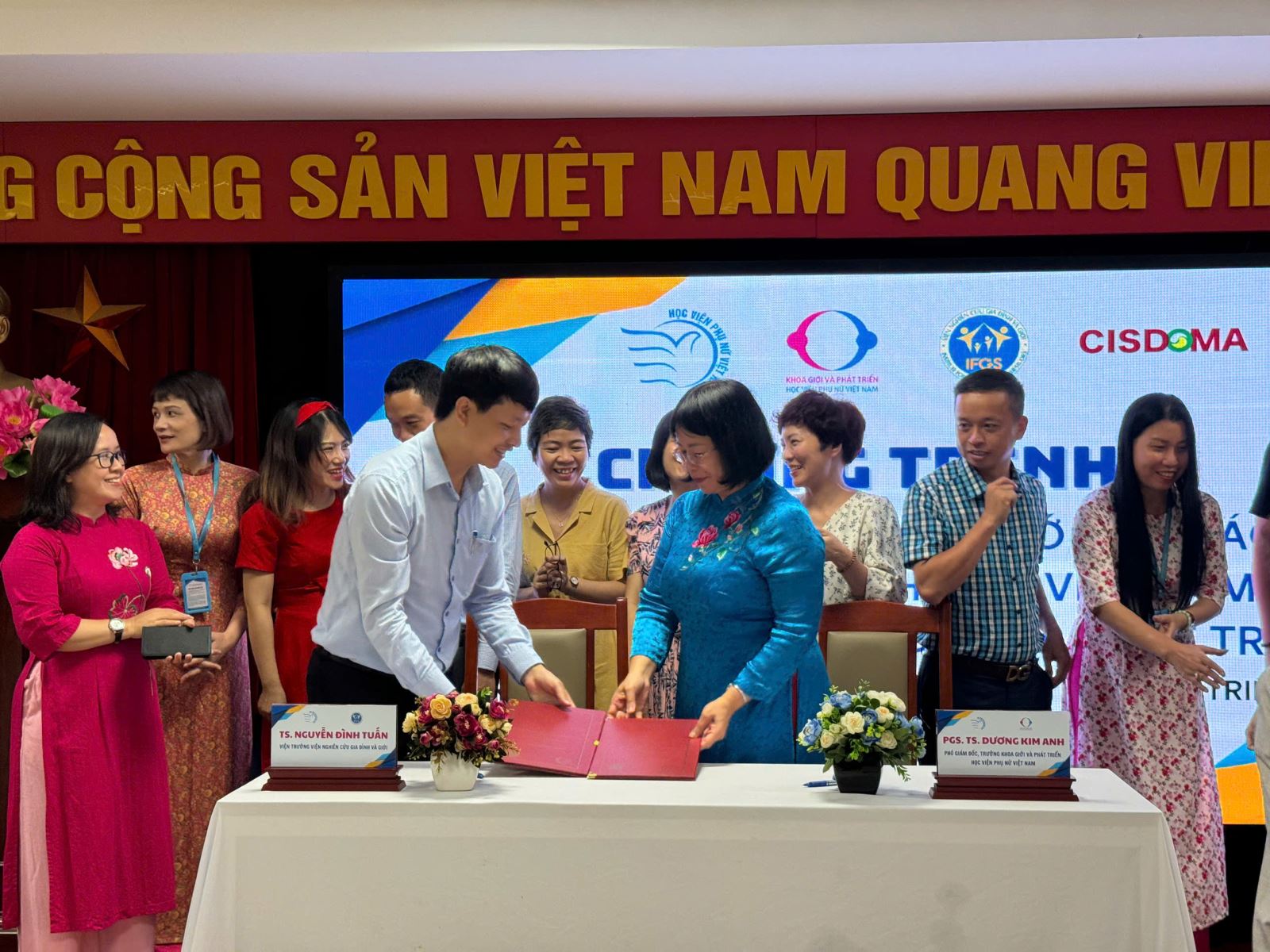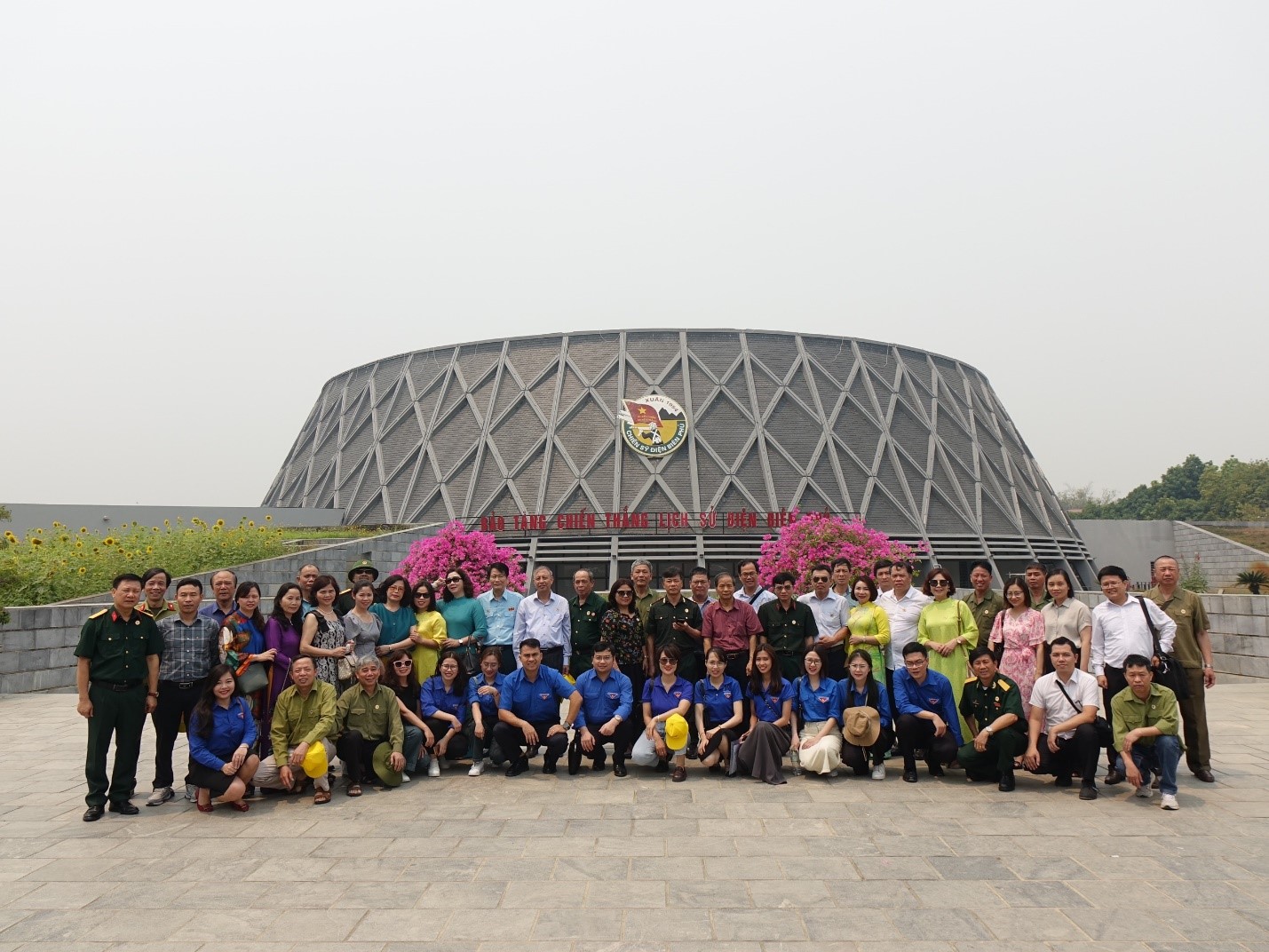Điểm nhấn
-
 Hội thảo “Thực trạng người Việt Nam hồi hương từ Vương quốc Anh giai đoạn 2014 - 2023”
Hội thảo “Thực trạng người Việt Nam hồi hương từ Vương quốc Anh giai đoạn 2014 - 2023”
-
 Lễ Ký kết biên bản ghi nhớ hợp tác giữa Học viện Phụ nữ Việt Nam với Viện Nghiên cứu Gia đình và Giới
Lễ Ký kết biên bản ghi nhớ hợp tác giữa Học viện Phụ nữ Việt Nam với Viện Nghiên cứu Gia đình và Giới
-
 Hội thảo khoa học: "Bộ chỉ số gia đình hạnh phúc: Một số vấn đề lý luận và thực tiễn"
Hội thảo khoa học: "Bộ chỉ số gia đình hạnh phúc: Một số vấn đề lý luận và thực tiễn"
-
 Tọa đàm khoa học "Vận dụng lý thuyết trong nghiên cứu khoa học xã hội"
Tọa đàm khoa học "Vận dụng lý thuyết trong nghiên cứu khoa học xã hội"
-
 Hội nghị Đối thoại giữa Chi ủy, Lãnh đạo viện với đảng viên, viên chức và người lao động Viện nghiên cứu Gia đình và Giới 6 tháng đầu năm 2024
Hội nghị Đối thoại giữa Chi ủy, Lãnh đạo viện với đảng viên, viên chức và người lao động Viện nghiên cứu Gia đình và Giới 6 tháng đầu năm 2024
-
 Chi bộ Viện nghiên cứu Gia đình và Giới tổ chức sinh hoạt chuyên đề: Đoàn kết thống nhất trong Đảng theo tư tưởng Hồ Chí Minh
Chi bộ Viện nghiên cứu Gia đình và Giới tổ chức sinh hoạt chuyên đề: Đoàn kết thống nhất trong Đảng theo tư tưởng Hồ Chí Minh
-
 Cuộc thi “Nét đẹp và giá trị gia đình Việt Nam” hưởng ứng Ngày Gia đình Việt Nam 2024
Cuộc thi “Nét đẹp và giá trị gia đình Việt Nam” hưởng ứng Ngày Gia đình Việt Nam 2024
-
 Hội Cựu chiến binh, Đoàn Thanh niên Viện Hàn lâm Khoa học xã hội Việt Nam đi thăm lại chiến trường xưa Điện Biên Phủ
Hội Cựu chiến binh, Đoàn Thanh niên Viện Hàn lâm Khoa học xã hội Việt Nam đi thăm lại chiến trường xưa Điện Biên Phủ
- Tổng mục lục Tạp chí 2023
-
 Viện nghiên cứu Gia đình và Giới phát động phong trào thi đua và ký Giao ước thi đua năm 2024
Viện nghiên cứu Gia đình và Giới phát động phong trào thi đua và ký Giao ước thi đua năm 2024
Liên kết web
Số lượt truy cập
23
5407463
Chi tiết tạp chíNo. 2 - 2013
Social Capital: Symmetric or Asymmetric? The Evidence from Vietnam
Nguyen Quy Thanh & Cao Thi Hai Bac
Abstract: This paper is intended to analyse the symmetry and/or asymmetry of social capital of the Vietnamese through three dimensions, namely quantity, type, and context of help. Based on data collected from 1430 respondents in five cities/provinces in Vietnam, these three dimensions are compared by using the Paired-samples T-test and McNemar non-parametric test. The findings suggest that social capital in Vietnam is generally asymmetric in terms of the quantity of help, and is rather symmetric in terms of the types of help and contexts of help. Particularly, help such as psychological support, sharing of important information and some contexts of help such as business investment, purchasing durable goods are usually asymmetric as there is more help received than help provided between involved partners. This asymmetry is closely linked to the closeness of friendship of an individual with his/her friends; thus, the more intimate the relationship is, the more likely the social capital becomes asymmetric.
Keywords: Reciprocity; Social capital of Vietnamese people, Symmetry and asymmetry of help; Symmetric and asymmetric of social capital.
Keywords: Reciprocity; Social capital of Vietnamese people, Symmetry and asymmetry of help; Symmetric and asymmetric of social capital.
Abstract: There have been changes in Vietnamese family structure in the tendency of decrease in scale, dependent ratio and nuclearization and diversity in forms. Changes in Vietnamese family structure feature the completion of population transition: average life-span exceeds 70, decreasing number of birth and total fertility rate reach replacement level. However, there are still differences in family structure in Vietnam among regions and ethnic groups. Socio-economic regions with lower economic growth and regions of ethnic minority groups often have larger household size. It could be demonstrated that socio-economic development in Vietnam has contributed to the changes in Vietnam’s family structure, through making influences on socio-demographic factors. In addition, new cultural context also have a significant impact on the process of changes in family structure through spread of lifestyle and consuming style, living condition, and flexibility in economic life of households.
Keywords: Family; Vietnamese household; Socio-demographic factors; Vietnam’s family structure.
Keywords: Family; Vietnamese household; Socio-demographic factors; Vietnam’s family structure.
Maltreatment of Children in Hanoi, Vietnam - the Role of Neighborhoods
Abstract: Using a questionnaire from the Families and Neighborhoods Study 2010, this article examines “Maltreatment of children in Hanoi, Vietnam – The role of neighborhood”, focusing on physical abuse and neglect. The research provides strong evidence of the importance of neighbourhoods in prevention of maltreatment in childhood, and of the injuries and fatalities stemming from it. Separate from neighbourhood structure, neighbourhood process is associated with both increased and decreased rates of child maltreatment. Further, informal social control has relationships with minor abuse but in the positive direction, indicating that social informal control could actually increase the rate of minor child abuse.
Key words: Children; Neighbourhood; Children maltreatment, Child abuse.
Key words: Children; Neighbourhood; Children maltreatment, Child abuse.
A Sociological Study on the Broken Marriages of Taiwanese - Vietnamese Couples
Abstract: The study used qualitative methods to investigate various relationship situations in which marriages began in Taiwan and couples relocated to Vietnam. The analysis is focused on the perspectives of Taiwanese men and Vietnamese women and how it affected their lives. For flexibility, the purposeful and snowball sampling techniques were used. The findings of this study support the policy of marriage migration from both the Taiwanese and Vietnamese governments and can provide the basis for raising awareness of all parties involved, including the governments of both countries. Finally, this research is useful as a reference to other researchers who want to study foreign marriages in Taiwan.
Keywords: Marriage; Family; Taiwan; Vietnam; Foreign marriage.
Keywords: Marriage; Family; Taiwan; Vietnam; Foreign marriage.

